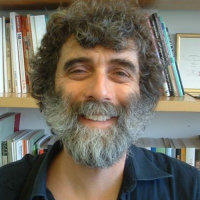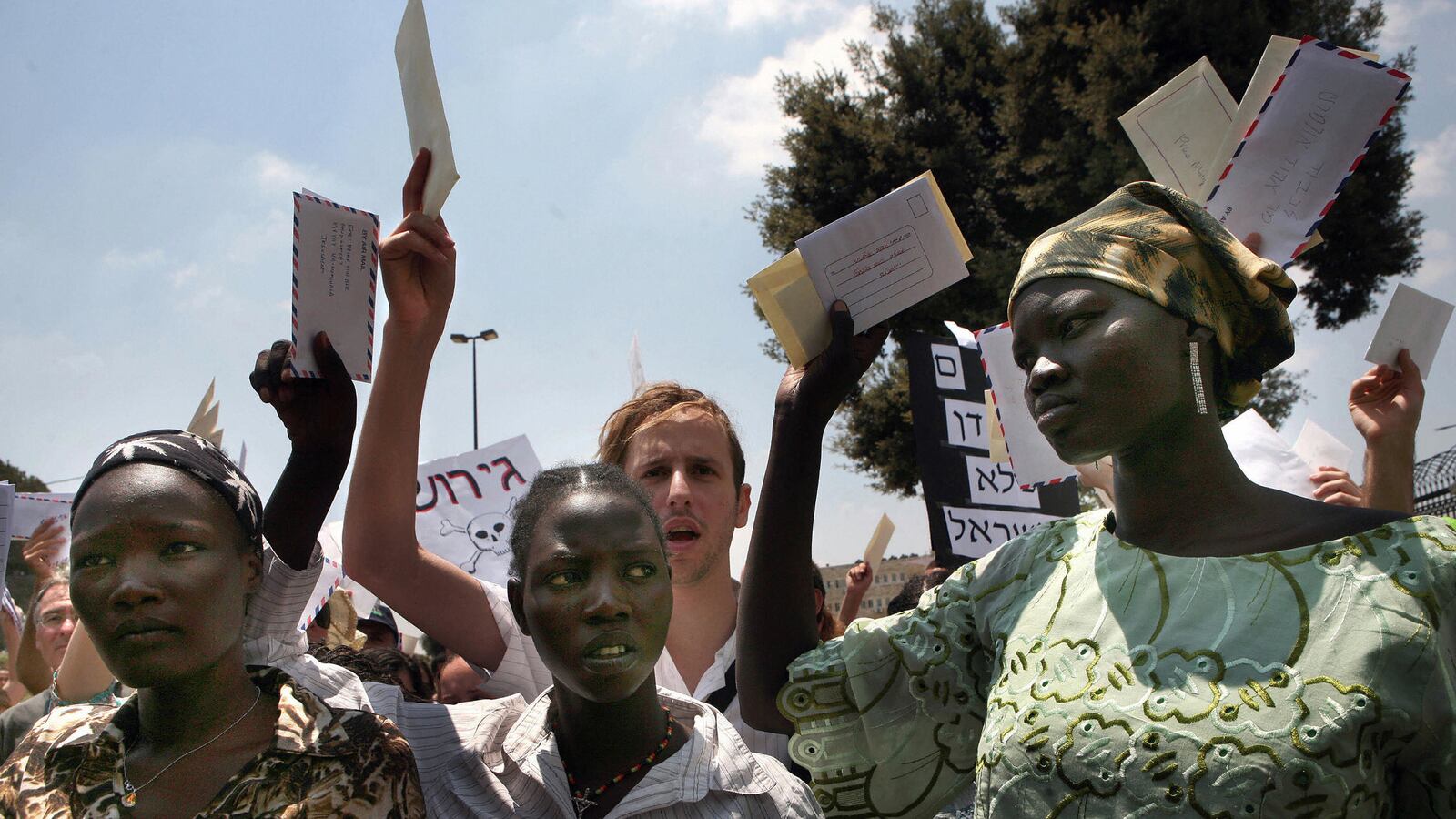The great airlift is on. Around the time I tap out the last word of this post, a plane will take off from Israel carrying South Sudanese refugees—the people whom Benjamin Netanyahu calls "illegal infiltrators"—back to their home country. The "infiltrators" must go, the prime minister explained in the cabinet, lest they "inundate" Israel and "largely put an end to its character as a Jewish, democratic state."
The Hebrew word for "infiltrator" connotes people slipping across the border to perpetrate terror. Nonetheless, such rhetoric puts Netanyahu on the mild side of his party and coalition. Likud Knesset Member Miri Regvev, you may recall, proclaimed last month at a Tel Aviv rally-turned-riot that "the Sudanese are a cancer in our body." Her party colleague, Ofir Akunis, has submitted a bill imposing a five-year prison sentence on anyone employing "infiltrators." (That's the Akunis who last year dismissed a TV interviewer's inference that he was conducting a McCarthy-like witch hunt against leftists by saying that McCarthy "was right in every word.") Interior Minister Eli Yishai, leader of the ultra-Orthodox Shas party, has asserted that "many women in Tel Aviv have been raped" by Sudanese refugees "but are afraid to file complaints lest they be stigmatized as AIDS carriers."

Actually, I'd like to get back to Netanyahu's view of what makes a country Jewish. First, let's note that the government's hyper-publicized campaign to deport the South Sudanese is a deception inside a diversion inside a con game. Out of 60,000 asylum-seekers in Israel, 1,000 or less are from South Sudan, as Sigal Rozen of the Hotline for Migrant Workers explains. Most Africans who have crossed the Sinai into Israel seeking safety are from Eritrea or other parts of Sudan, including Darfour—places where their lives would be in danger if they went home. The 1951 U.N. convention on refugees bars deporting them. Whether the South Sudanese will be safe in their newly independent homeland is far from certain—but removing Hebrew-speaking South Sudanese children from their Israeli classrooms and deporting them won't dent the number of refugees.
If Netanyahu were really concerned about the number of Jews and non-Jews under Israeli rule, he'd pay attention to the brontosaurus in the living room: the occupation of the West Bank. Instead, he's building new homes in settlements, evading negotiations with the Palestinians, and diverting the public's attention by talking about African refugees. Interior Minister Yishai has more mundane trouble: An impending report from the State Comptroller is expected to find him responsible for government's failure to cope with the disastrous 2010 Carmel forest fire, in which 44 people died. He apparently believes he can preserve his popularity by stoking fears of diseased foreign rapists. Regev and Akunis, to be fair, are probably not engaged in deception. They really are the rabble rousers they claim to be.
Indeed, like any normal developed country, Israel attracts both refugees and economic immigrants. And like any normal developed country, it has politicians who portray strangers as the source of all ills. However, Israel is idiosyncratic in three ways: First, It has a land border with Africa, making it marginally easier for refugees from that continent to get here than to reach Europe. Second, our immigration laws date to when Israel was poor and no one but Jews wanted to come here, so the country lacks coherent policies for asylum and economic immigration.
Third, Israel is supposed to be a Jewish country. But what does that mean?
Judging from Benjamin Netanyahu's speeches, he thinks the most powerful piece of the Jewish experience is the dread of the late 1930s. I suggest he visit the part of Yad Vashem that portrays those years. On the wall is a quotation from an Australian official explaining why his country would not accept more Jewish refugees: "As we have no racial problem, we are not desirous of importing one." Canberra wanted to keep Australia Australian. Surely, the lesson from history for a Jewish state is not to emulate that attitude.
As for Interior Minister Yishai, he presumably regards the Torah and rabbinic tradition as the core of Jewishness. Maybe the verse from Leviticus, "When a stranger resides with you in your land, you shall not wrong him," has just slipped his mind, along with the standard rabbinic view that Sodom, most evil of polities, was condemned for its policy of barring strangers from its gates.
At our table last Shabbat, we had a young IDF officer who usually avoids talking about politics. But the round-up of refugees upset her. "Honestly, I think for the country to be Jewish, the number of Jews is less important than having Jewish values," she said, very quietly. Promote her to prime minister, I say, and fire the one we've got.






